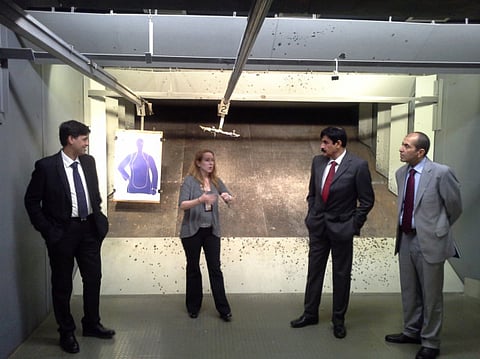Dubai Police: Keeping one step ahead, always
New building will be ready by 2014 and will be equipped with latest technology

Dubai: In its ongoing quest to solve crimes and clinch convictions, Dubai’s crime-fighting unit will soon be on a par with its global counterparts, a senior police official said.
In an exclusive interview with Gulf News, Major General Khamis Mattar Al Mazeina, Deputy Chief of Dubai Police, said that new sections and programmes will be added to the Department of Criminal Evidence and Criminology (DCEC).
“Dubai Police’s forensic department will not be the same anymore,” said Major General Al Mazeina.
The police team recently visited laboratories around the world and set up partnerships with world-class training institutions. The department currently comprises seven sections that work in tandem on a variety of cases, each playing a specific role in investigation.
He said a new trace evidence analysis section will be added to the department.
“It will help in tracing a crime and will cover all types of evidence such as fibres, hair specimens, feathers, paint and glue,” he said. He added that another programme identifies criminals by their body odour.
“This programme is still under development internationally and when it is ready it will be adopted by Dubai Police,” he said. The department is relocating to a new building which will be ready in less than two years.
“It will be the first-of-its-kind in the region and it will accommodate 700 employees and be equipped with top-notch equipment to fight all kinds of crimes,” he said.
“In order to achieve our aim we paid recent visits to the best-known laboratories around the world to learn about the latest in the field of crime fighting and to set up partnerships with the world’s best institutions for training in order to train Dubai Police experts and upgrade the police laboratory with the latest techniques of analysing physical crime evidence,” said Major General Al Mazeina.
He said the Dubai Police team recently visited the Netherlands Forensic Institute.
“We were updated on the latest developments in the field of nuclear sciences, biological, radiological and chemical and the techniques of forensic methods to solve crime, in addition to the developments in forensic automation,” he said.
‘Chance to learn’
Major General Al Mazeina said that the team visited FBI laboratories in the US and several police officials will undergo FBI training.
“We met with the head of the lab, D. Christian Hassell, who talked about the methods of tracing evidence and the latest techniques for the analysis of hair, fibre and pollen,” he said.
Major General Al Mazeina said at the Homeland Security Laboratory the Dubai Police team was shown how to check documents for fraud such as passports, ID and credit cards and on the latest in fingerprint examinations and the analytical chemistry related to documents involved in homeland security.
They also illustrated how to analyse ink, which could be important evidence in some cases.
“Visiting the Miami-Dade Police Training Bureau was a great chance to learn how to develop and manage the disaster response operations room,” he said.
He added that this laboratory was highly equipped and was where police officers devised emergency scenarios and were trained.
“At the Miami-Dade police forensic bureau we were updated on the fingerprint section where we saw how evidence was received and evidence processed, lifting prints and comparing them to the database. The firearms section was the second in the tour. At the DNA section the police team heard about the latest DNA analysis and the focus on drug, paints and glass analysis.”
The team also visited the International Forensic Research Institute (IFRI) where a number of police officials will go to study.
“We sent our police officers to study abroad and now 86 police officers are studying in the US and Germany, including eight postgraduates,” he said.
“We also toured the Office of the Chief Medical Examiner (OCME) and the Forensic Biology Laboratory to learn about all the specialised units in the laboratory. Among the best units to present was the highly sensitive DNA typing approach that is very well known for profiling a very low amount of DNA.
“Mass fatality units are considered one of a kind in responding to dealing with victims’ families.
“Those established after the 9/11 incidents, together with another unit that deals with the analysis of DNA from the human remains of victims until now have analysed more than 22,000 samples.”
He added the DNA database unit illustrated its vital role in helping to solve crimes and they also visited the anthropology unit, which deals with unknown skeletal remains to determine the person’s age, sex, height and probable cause of death.
“We want to train police and establish more expertise in the field of fighting crime,” said Major General Al Mazeina.
Sign up for the Daily Briefing
Get the latest news and updates straight to your inbox



